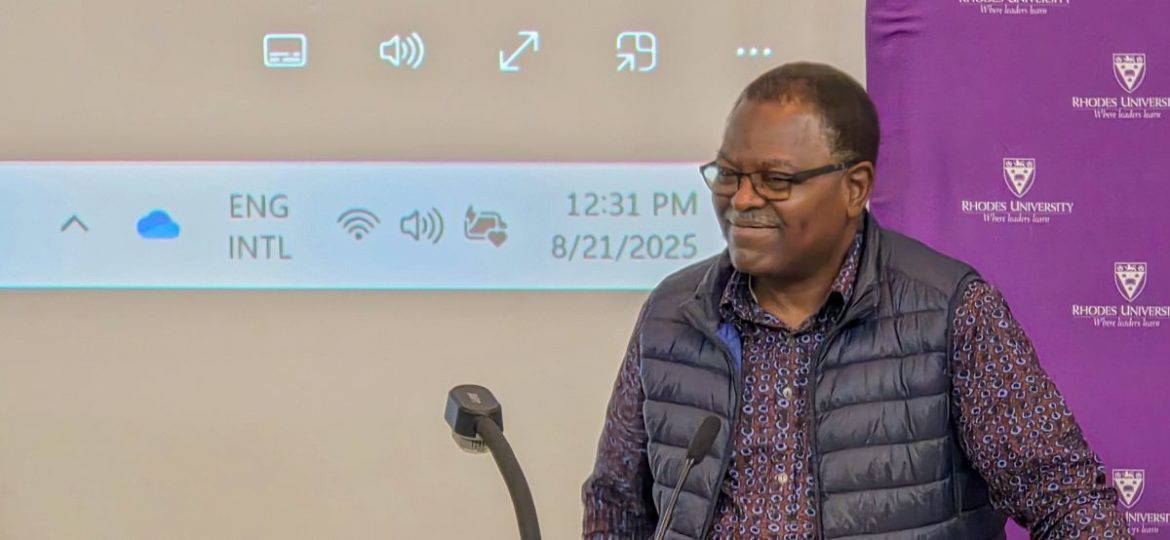Digital Uprising: The Flower of Mimboland by Francis Nyamnjoh
BOOK REVIEW
By Thandeka Bukula
Francis Nyamnjoh’s Digital Uprising: The Flower of Mimboland is at once a novel and a vehicle for theory. As with much of his work, fiction becomes a stage where he elaborates concepts central to his scholarship, including incompleteness, conviviality, and cannibalism. The novel, while playful and allegorical, mirrors the postcolonial condition of many African societies, exposing both the violence of power and the possibilities of imagination.
Nyamnjoh is a professor of anthropology at the University of Cape Town. He was a keynote speaker at the recent Anthropology Southern Africa conference held at Rhodes University, where he launched his latest novel.
The story plays out in the fictitious country of Mimboland, where President Longstay has plundered the nation into a dystopia through fear and supernatural domination. At the heart of the tale are enigmatic nanobots commanded by his estranged daughter Liberte, whose omnipotence through the use of the bots echoes Longstay’s own supernatural reach, “how even the dark seemed to whisper his name”. The Liquid Army of nanobots parallels Longstay’s Animal Army, made up of “fearsome predators, crocodiles, anacondas, and even supernatural lions tasked with devouring his formidable political enemies”. These parallel forces of domination raise questions around the extent to which this new regime still renders Mimboland’s citizens perpetually vulnerable to control and consumption, or will Liberte ultimately turn her inherited power into something new and different.
Liberte herself is a compelling character. She is President Longstay’s daughter, born a boy but later transitioning into a girl, a transformation whose why and how are never fully explained. Her very being embodies Nyamnjoh’s idea of incompleteness, fluid, open-ended, and resistant to closure. Yet she is also marked by neglect. Born outside of Longstay’s marriage, she was largely ignored by her father, who paid her little attention. This marginality complicates her role as leader of the digital uprising, positioning her simultaneously inside and outside the structures of power she seeks to transform.
This imagery speaks directly to Nyamnjoh’s theorisation of cannibalism. As Bayart (1989) and Beresford (2015) remind us, the “politics of the belly” has long described how greed and corruption hollow out governance. For Nyamnjoh (2017), however, cannibalism is more than metaphor. Postcolonial African states have refined colonial strategies of extraction, producing what he calls “cannibal democracy”, where rulers feed on the life chances of their own people. Cannibalism, he argues, is not only literal consumption but also the everyday devouring of opportunities, dignity, and futures. This makes cannibalism central to what it means to be human, we are all caught in an endless cycle of eating and being eaten.
Yet Nyamnjoh balances this unsettling reality with his advocacy for incompleteness and conviviality. In Digital Uprising, African indigenous ways of knowing co-exist with digital technologies, refusing simple binaries between the “traditional” and the “modern”. Incompleteness, for Nyamnjoh, is not a flaw but an openness to continual becoming, a humility that recognises our need for others. Liberte’s own incompleteness, her gendered transformation, her ambiguous relation to power, and her uneasy inheritance of Longstay’s legacy, captures this openness. She embodies both rupture and renewal, a reminder that identity, like democracy, is never finalised.
Conviviality, in turn, is the practice of co-existing across difference. Even as Mimboland reels under Longstay’s predations, Nyamnjoh gestures towards relationality and repair, insisting that conviviality remains possible amidst cannibalism. The fact that Liberte, neglected and illegitimate, rises to lead a digital movement of hope suggests that convivial futures may emerge from the margins rather than the centre of power.
The contrast between President Longstay and his predecessor Baba sharpens these themes. Longstay, aptly named, represents the “big men” of African politics, unable to relinquish power. Baba, by contrast, willingly steps aside, embodying an alternative ethic of trust and nation-building. This juxtaposition raises questions central to the novel, can liberators resist becoming oppressors? Is democracy compatible with leaders who imagine themselves as kings? Longstay’s clandestine dealings with colonial Mzungus further highlight the dangers of assimilation, exposing how postcolonial rulers inherit and reproduce the very systems they once opposed.
Technology becomes a key site of this ambivalence. Longstay’s grotesque transformation into a louse in the First Lady’s wig dramatises how technology can be weaponised for domination. Yet through Liberte and her relationship with the nanobots, Nyamnjoh complicates the picture, are digital technologies harbingers of liberation, or merely reincarnations of old hierarchies? He reminds us that tools are neutral, echoing the adage that “guns do not kill people, people kill people”. The ethical weight lies in human choices.
As the novel declares, “the revolution was not a single event, but an ongoing process, a constant evolution” (p2). Mimboland’s story becomes “a testament to the enduring human spirit and the intricate dance between technology, power, and freedom.” In this way, Digital Uprising is both allegory and provocation. It implores readers to rethink power, technology, and the human condition through the lenses of cannibalism, incompleteness, and conviviality.
Nyamnjoh’s genius lies in his refusal of closure. Even in a world marked by cannibalism, he insists on hope, not naïve optimism, but an acknowledgement that the unknown holds possibilities as well as dangers. The novel affirms that to be human is to be incomplete, to live with and through others, and to embrace conviviality as an ethical practice. In Digital Uprising, fiction becomes philosophy, and Mimboland becomes Africa, reminding us that liberation is always unfinished business.
- Thandeka Bukula is a doctoral student in the School of Journalism and Media Studies at Rhodes University
Source: When liberators become predators: a tale of African democracy – Grocott’s Mail

